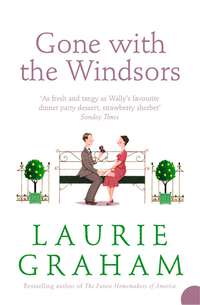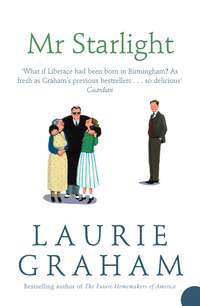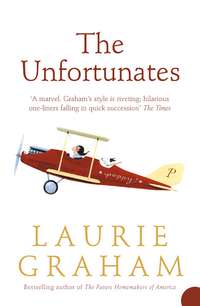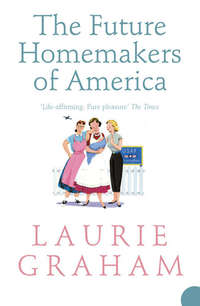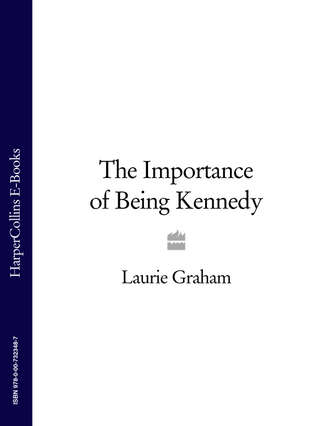
Полная версия
The Importance of Being Kennedy
But she'd only had forty-seven years and she could have had more if she hadn't been such a muggins about taking off her vest in front of the doctor. She died in the autumn of 1911 and before the year was out Edmond took off his thinking cap and announced he was marrying the Clavin widow from Horseleap and bringing her to our home. So my mind was made up for me. I couldn't have stayed in the house with that woman. She'd a face would turn fresh milk. Margaret sent me the fare and I was on my way.
Marimichael went into a cotton mill when we got to Boston, same as her sister, and Margaret could have got me a start at the grocer's where she worked, but Ursie had bigger ideas.
She said, ‘You've a brain in your head, Nora. Use it. Nursing would be suitable. The uniforms are very attractive.’
But I liked the idea of going into service, somewhere where I'd have my own room.
I said, ‘If I'm going to wipe BTMs and mop up dribble I'd as soon do it for a nice sweet little baby as somebody who smells of sickness or some grouchy old feller. I'll go for a nurserymaid.’
‘Just be sure it's the right kind of family,’ she said. ‘A doctor, or a lawyer, like Mr Jauncey. Cultured, professional people. There are people who have money to run a full staff but no breeding. You don't want to end up with a family like that.’
I got a start with the Griffin family in Cambridge, Massachusetts, to look after Loveday who was three and the baby who was on the way, Arthur. Ursie seemed to think they were good enough for me, even if they were a bit modern. Dr Griffin was a scientist at the university but he thought nothing of pushing the bassinet out on a weekend. There was only me, a housemaid, a woman who came in on Mondays to do the laundry and a man who helped with the garden. Mrs Griffin did all the cooking and I had every Sunday off and one night a week. I used to meet Margaret at a soda fountain and she'd give out to me about Ursie while we watched the boys go by. That's where we met Jimmy Swords and Frankie Mulcahy.
It's a funny thing about boys. They go around in pairs and if one of them is good-looking the other's sure to be a poor specimen. That was Frankie. He always looked like he'd lost a dollar and found a cent, but Margaret fell for him, and Jimmy was keen on me. The only problem with Jimmy and Frankie was they worked as fish porters. They were always washed and shaved and dressed in a nice clean collar and tie when we saw them, but there was still that smell. You can never get rid of it. Jimmy seemed steady though. We never quarrelled, and the Griffins liked him because he used to bring oysters for them or a lobster, when he came to walk me out.
I had my nursery and my own room up under the roof and I had my beau. I was very suited, but then Dr Griffin said he was moving to a different university, in California, and I had to decide whether to go with them. Ursie thought I should.
She said, ‘You've made a good start, Nora, now build on it. The Griffins think highly of you and you mustn't flit from position to position. It doesn't inspire confidence.’
But Jimmy didn't want me to go.
He said, ‘I'm putting money by. Stay in Boston and we'll get married. Next year.’
So the Griffins went off to California and I applied for a new position, in Beals Street, Brookline. The Kennedy family. They had a little one just walking, Joseph Patrick, and another one on the way.
I had to go to the house to be interviewed and inspected by Mrs Kennedy. She's only a year or two older than me and people say she has the secret of eternal youth. To look at us now you'd think I could give her a few years, but that first day I met her she seemed quite the little matron. First thing she told me was how she had to be most particular about the help she employed, because of her position.
She said, ‘My husband is president of a bank.’
The house was nothing to shout about and neither was the money they were offering.
She said, ‘And I expect you recognise me.’
But I didn't know her from Atty Hayes's donkey. She laughed.
She said, ‘You're a newcomer. If you were Boston-born you'd know my face from the dailies. I'm Mayor Fitzgerald's daughter.’
Well, you couldn't be in Boston five minutes without hearing of him, so that satisfied her. She rattled on, perched at her bureau like a neat little bird, telling me all about her travels and the big names she'd met. She even had tea brought in, and I still didn't know if I had the job or not.
‘I was my father's right-hand woman,’ she said. ‘My mother didn't have the nerves for public life so I went everywhere with him. But now of course I'm too busy running my own home. Mr Kennedy works very long hours in business.’
And that was the truth. I was there three weeks before I properly met him. He'd get home late and leave again early. He was a tall carrot-top of a man with a tombstone smile and ice-blue eyes. He came up to the nursery one Saturday morning and started throwing Joseph Patrick up in the air to make him squeal.
He said, ‘I'm Joe Kennedy. You have everything you need? Anything you need, tell Mrs Kennedy. Money's no object. And make sure this boy of mine eats his greens. I have big plans for him.’
Mrs K gave me a book to read the day I arrived, on how a nursery should be run. Everything was to be done by the clock. When the new baby came she was going to nurse it, but between feeds there was to be no picking it up or rocking the cradle. If it cried, it cried. And little Joseph Patrick wasn't to be played with, except for half an hour of nursery rhymes and physical training in the afternoon. He'd to learn to entertain himself with toys, and the only time he was allowed to snuggle on my lap was for his bedtime story.
She said, ‘Too much petting makes a child fussy and it's a very hard habit to break.’
‘Yes, Mrs Kennedy,’ I said. And I did try to follow her rules but it didn't seem a natural way to raise a child. Well, she didn't have to know everything that went on in my nursery. I had my routines and she had hers. She'd walk to St Aidan's every morning to early Mass, and then she'd do the marketing and write letters till lunchtime. Always a chicken sandwich and a glass of milk. In the afternoon she'd take a nap, and then have her hair done or go to the dressmaker's and once a week Mayor Fitzgerald would come to tea. The way Mrs K talked him up, ‘His Honour this, His Honour that,’ it was like expecting the President himself. It was such a let-down the first time I saw him. He was just a crafty-looking old knacker riding round in a limousine car, but Mrs K thought the sun shone out of her daddy's fundament.
Sometimes on a Friday night Mr K would have some people in for bridge, business gentlemen and their wives, but otherwise she didn't see a soul. Her mammy never visited, nor her sisters, and the neighbours on Beals Street kept to themselves.
The Ericksons' maid said, ‘She thinks she's the cat's pyjamas, your missis, but nobody round here's impressed.’
We knew war was coming. It seemed to have nothing to do with us back in 1914, but we could feel it just around the corner by the start of 1917. Mrs K said it was a terrible unsettled time to be bringing a new baby into the world but at least Mr Kennedy wouldn't have to go away to fight. She said he was too old, but he wasn't. He was twenty-nine, same as Jimmy Swords.
Jimmy and Frankie Mulcahy both volunteered. There were a lot of the Irish who wouldn't, not wanting to take sides with the English, not even against that terrible Kaiser, but Jimmy said, ‘I'm an American now and Americans are going to fight so I'm with them.’
Not Mr Kennedy though. All of a sudden he got a management position at the Schwab shipyard in Quincy, reserved occupation, and when they drafted him anyway he went to a tribunal to appeal and he won. Mrs K said they'd made an error when they tried to draft him because he was engaged in vital war work, but that was only because Mayor Fitzgerald had pulled strings to get him in at the shipyard. Whichever way you cut it, Joe Kennedy was a draft-dodger. But that's water under the bridge. God knows, we've had another war since then and what he got away with in 1917 he's paid for in buckets since.
Jimmy went off to a training camp, but the doctors failed Frankie because of his chest and he was sent to a uniform factory in Pennsylvania, as a machinist. Margaret thought we should have married them before they went, but Jimmy never offered it and I had my mind on my nursery. Mrs Kennedy was very near her time.
A weekly nurse was hired and Mr K moved into the guest room so we could get the big bedroom ready. All the little trinket boxes and hairbrushes had to be cleared off the dressing table, and the rugs lifted and the floor washed down with carbolic acid and boiling water, for reasons of hygiene, the nurse said. It made you wonder how the human race ever got to be such a thriving concern.
Mrs K came along to the nursery still in her bathrobe that morning. She said she'd had a few pains in the night but she hadn't wanted to say anything till Mr K had gone off to business.
‘This is woman's work,’ she said. ‘Now we'll get on with it. We'll have this baby delivered and everything tidied away by the time he comes home.’
I took Joseph Patrick to the park and played with him on the teeter-totter and by the time he'd had his soup and laid down for his nap the doctor had been sent for.
I'd never seen a baby born. When Mrs Griffin had baby Arthur she went to the nursing home so they could give her the twilight sleep and then she had two weeks of lying-in before she brought him home. I knew the facts of life and I'd seen plenty of sows dropping their piglets but it was hard to relate that to Mrs Kennedy. I'd heard it said that women screamed and cursed and that there was blood and worse, but she'd hardly a hair out of place. She just lay there with the ether inhaler over her face and Dr Good fetched the forceps out of his bag and fairly dragged the poor mite into the world. John Fitzgerald Kennedy. Though, as I recall, he was hardly ever called John. He was Jack right from the start.
The nurse told Mrs K she had another boy but she was too doped for it to register or even to hold him, so he was given to me to put in the crib. And it was a grand thing, to cradle him in my arms and see his surprised little face and his tiny fingers weaving in the air, to wonder what life had in store for him. I was the first to hold the next three Kennedy babies and every time it gave me that nice, funny feeling, like someone slipped a piece of velvet inside my tummy.
But by the time Mr Kennedy came home from business, Herself was wide awake, washed and powdered and sitting up in a new satin bed jacket. Then His Honour the Mayor turned up, with Mrs Fitzgerald, who I'd never seen before, and a bouquet of carnations. They came to the nursery to take a look at Jack but they didn't seem very interested in him. He'd been given Fitzgerald for one of his names so I'd have expected them to be thrilled.
His Honour said, ‘He'll do, for a spare. Now let me see my best boy.’
And I had to go contrary to all Mrs Kennedy's instructions and wake Joseph Patrick from his bed, to be petted and made overexcited by his grandpa.
‘See this fine feller?’ he said. ‘This fine feller is going to be President of the United States.’
It's a funny thing, there was never any love lost between Mayor Fitzgerald and Mr Kennedy but that's one thing they always agreed on. Joseph Patrick was going to be President.
THE TROUBLE WITH BLOOD FITZWILLIAM
But I was saying about 1948. The minute her mammy was on her way to the aerodrome Kick got the shine back in her eyes.
She said, ‘That was pretty gruesome. Daddy'll fix everything. He can probably get us a special dispensation from Rome.’
I said, ‘The Holy Father won't change the rules, not even for a Kennedy.’
She said, ‘This Holy Father might. He's practically part of the family.’
Part of the family my eye. He paid a call once, that's all, long ago, when we were in Bronxville, and that was only because Mr Roosevelt couldn't think what else to do with a visiting cardinal all afternoon, only send him to Mrs Kennedy for a cup of tea.
She said, ‘And we had a private audience. He gave me a rosary.’
I said, ‘I know. I was there. And so was Fidelma Clery He gave us all rosaries. He gets them wholesale, I'm sure. But that doesn't mean he hands out dispensations so a man can have two wives.’
She got into such a paddy.
She said, ‘Why doesn't anyone understand? Blood married Obby in one of their churches, so as far as our church is concerned he's never been married. Anyway, the Holy Father can change anything he wants to. Especially if Daddy sends him a big fat cheque for a new altar or something.’
There were cablegrams flying back and forth all that week and then Blood Fitzwilliam turned up, like the bad penny. He was back in town and expecting to take her to lunch. When you're in service you notice that the ones who're too grand to give you a ‘Good day’ are not necessarily the ones with the biggest estates or kings in their family tree. Just a middling rip like Fitzwilliam can be full enough of himself to ignore the help.
As soon as she heard his voice, Kick was ready to grab her pocketbook and go.
I said, ‘Didn't you tell me Lady Ginny was calling for you?’
‘Oh Lord,’ she said. ‘Well, she's late. Just tell her something came up, would you? She'll understand.’
He'd picked up the telephone without so much as a by-your-leave, putting through a call to his club, tapping a cigarette on his silver case. Kick was watching me watching him.
She said, ‘Darling, no smoking in the hall. Nora's got her fierce face on.’
‘Sweetie,’ he said, ‘who pays Nora's wages?’
It was four o'clock when she came home, pink and silly from champagne wine.
She said, ‘Blood's going to take me down to Nice for a vacation, next month. Such bliss. We're going to stay with his friends at their villa, and then by the time we come back Daddy will be in Paris, so we'll be able to stop off and see him. It's all worked out perfectly. We can have a big powwow about asking the Pope and things, without Mother being there to have a fit, and Daddy and Blood can get to know one another.’
I said, ‘Angel girl, will you listen to yourself? All this talk about marrying. Is the man divorced from his lawful wedded wife?’
‘He soon will be,’ she said. ‘He just has to see the lawyers. Then it won't take long. Obby's going to cooperate. You know they haven't had a real marriage for years.’
I said, ‘And what about his child? Where does she fit in to a divorce?’
She said, ‘She'll be fine. I expect we'll live at Coolatin when we're not in London, and she'll be able to come to visit us and keep a pony there and everything. I'm sure she's an absolute sweetheart, and I'll bet she'd love to have some little brothers and sisters. I'm going to have dozens of babies for you to look after, Nora, and we'll all live happily ever after. Blood will charm Mother off her feet, and Pat and Jean'll come over for the hunting. We might even be able to have poor Rosie to stay.’
Ah yes. Poor Rosie. Well, there was a name she knew better than to bring up with her daddy if she wanted to get him on her side. We never mentioned Rosie any more, except below stairs.
A PERFECT LITTLE DOLL
Rose Marie was born in the September of 1918. It was a darker time even than when Jack arrived. We didn't only have the war still dragging on and our men far from home, we had the influenza too, and that was on our very doorstep. We hardly left the house. There was such a scare on that Herself didn't even go to Mass. Cook went out in a gauze mask to do the marketing and the laundrywoman was told not to come, for the duration, because she was in and out of different houses all the time. There was no telling what germs she might carry with her. Mr K slept on an army cot at the shipyard most nights sooner than risk bringing the infection home. Some people said the docks were where it had started.
No one we knew in Brookline got sick, but the Ericksons' gardener reckoned there was a four-week wait for funerals in Boston, there were so many bodies to bury, and after it was over I heard that Marimichael Donnelly had been one of them, ironing sheets in the afternoon and dead by midnight. Three little ones left without a mammy. To think she left Ballynagore to finish up like that. She was strong as an ox, Marimichael, but that was the thing about the influenza. It carried off the strong and didn't touch the babies and the old folks.
Before Rosie was born Mrs Kennedy decided she needed an extra nurserymaid. She hired Fidelma Clery. Flame-red hair and terrible, crooked little teeth. I was glad of the help. Young Jack caught every cough and cold that was going, and Joseph Patrick had the very devil in him, always climbing into trouble and tormenting Jack and taking his toys.
‘Why is he still a baby?’ he used to ask. ‘When will he be big enough to fight me?’
His Honour was the one who encouraged fighting, play-boxing with him, showing him how to put up his little dukes.
Mrs K gave Fidelma the gospel on nursery routines to read, but I know she never opened it. Fidelma was a bit hazy when it came to reading. Every time she told the story of the Gingerbread Man it ended different. But she had enough common sense to get by and the first time Joseph Patrick gave her any trouble she picked him up, hollering and kicking, and carried him to his room like a roll of linoleum.
The weekly nurse came a few days before the baby was due and Mrs K started her pains right on time, same as she did everything else. Everything was going along nicely and I quite thought we'd be cleared away by teatime with the baby safe in her crib, but when it came time to send for the doctor he couldn't be reached. He'd been called away to somebody with complications, and you couldn't send for any other doctor. They were all run off their feet with influenza cases
I said, ‘It hardly matters. It's her third child. She knows what to do.’
The nurse said, ‘That's not the point. I can't let her have it. If the doctor isn't here when it's born he won't get his fee and then I'll be for it.’
It seemed to me you couldn't do much to stop a baby if it was ready to come, but she was the nurse and I was only there to help. So we tied Mrs K's knees together with a scarf and the nurse instructed her that whatever she did she mustn't bear down when she got one of her urges. She was a model patient. I never heard her cry out once. And that's how we kept Rose Marie from being born until Dr Good arrived, bounding up the stairs with his ether mask.
I loved all my Kennedy babies for their different funny little ways but Rosie was the real beauty among them. She'd a mop of black hair and big green eyes and she was so contented. She'd lie in her crib for hours smiling at the world and playing with any little toy you gave her. Not like Jack, always crying. Not like Joe, always looking for trouble.
If I'd been Mrs K I'd have been up in the nursery gazing at Rosie all day long. She was like a perfect little doll and Herself loves dolls. Sure she has a whole room full of them at Hyannis, all in their glass cases. But she didn't trouble us much in the nursery. She preferred to be down at her bureau, clipping out articles on how children should be raised and making lists of things that had to be seen to. Timetables, charts for their weight, charts for their teeth.
Joseph Patrick was forever asking why did I live with them.
‘Don't you have a mother and a daddy?’ he used to say. ‘This is my house. But when I go to school I guess you can still stay here. You can look after Rosie.’
I wasn't sure I would be staying because me and Jimmy Swords were sort of engaged. Frankie Mulcahy was back from Pennsylvania and Margaret wanted us to name the day as soon as Jimmy came home from Flanders. A double wedding at Most Holy Redeemer and then to Mazzucca for ice-cream sundaes. She had it all planned. But Jimmy didn't come back in a marrying frame of mind.
He said, ‘Why bother? Bringing more kids into the world. Cannon fodder for another war. Factory fodder for the bosses. It's all shite.’
He'd got in with a lot of socialists in his battalion, putting the world to rights while they were waiting to be sent up the line to fight the Boche.
I said, ‘I thought we'd won this war so there won't ever be another one. And what'd happen if everybody had your attitude? There'd be no more babies. Nobody to look after you when you're in your bath chair.’
He said, ‘I'm not going to be in a bath chair. I'll put a bullet in my brain sooner. And I'm not getting married. It's nothing personal, Nora. You can keep the ring.’
Silly beggar. He'd never given me a ring.
I did wonder, had he met someone else, somebody prettier. One of those French mam'zelles. Mammy always said it was a good thing I had my health and strength because my face would never make my fortune. I wasn't exactly heartbroken over Jimmy but I did stop looking in the mirror for a while. Looking in the mirror could make a girl lose heart.
Ursie said, ‘Never mind. You're better off staying single. You've a nice little job and a roof over your head and that's more than Margaret will ever have. Frankie Mulcahy isn't fit to mind a canary, never mind a wife and family. There'll be a baby every year and never enough money to pay the electric. You'll see. She'll be broken down and worn out. So don't break your heart over Jimmy Swords. You've had a lucky escape.’
Margaret didn't have a baby every year though. Nothing happened on that front for a long time. And as for Jimmy, I don't know that Ursie was right. He was a good man. It was just that the war had chewed him up and spat him out, bitter and twisted. When Ursie said these things you always had to keep in mind that she was probably a disappointed woman, on the quiet. She worshipped her Mr Jauncey and yet all he ever did was say, ‘Take a letter, Miss Brennan.’
Poor Ursie and her little two-cup teapot.
Rosie sat up at six months, same as Jack did, but she wasn't interested in walking or talking. She was happy just to sit and watch the world go by. Mrs K said we were to stimulate her more, talk to her, and pull her up onto her feet to give her the idea of walking.
Fidelma said, ‘There's not a thing wrong with her. She only seems quiet because you're used to the boys racketing about. If you ask me we should be thankful. She never gives us a minute's trouble.’
Mrs K said, ‘I didn't ask you, Fidelma. And I want particular attention paid to Rose Marie's activities. We can't have her falling behind.’
Well, Rosie got up and walked when she was good and ready, and she talked too. She just didn't put herself out. If you threw her a ball she'd pick it up and look at it, but it never occurred to her to throw it back. And when Mr K came up to the nursery he didn't seem to know what to do with her. The boys would clamber all over him begging to be tickled to death. Rosie would just sit smiling at him, holding back.
Later on Mrs K made quite a project of Rosie, tutoring her for hours on end to try and get her up to the mark with her reading and writing, but in those early days Joseph Patrick was her big project.
‘He's the foundation stone,’ she said. ‘If the oldest child is brought along correctly, the others will follow suit.’
Everything she did was in aid of Joseph Patrick growing up the brightest scholar and a champion sportsman and a Light of Christ altar boy. She took him to the Franklin Park Zoo one afternoon to set the scene and tell him about the poor Christian martyrs, but when he came home all he did was keep springing out at Jack and Rosie, playing at killer lions. Well, he was only four.
She kept up with all the new books that were brought out too, and fetched them from the lending library to read to them, but when I was left to read them a story they always wanted their old favourite, about Billy Whiskers the Goat. It had been given them by their Aunt Loretta Kennedy and they loved that book, but Herself thought it was a dreadful story for children. She said it encouraged naughtiness instead of obedience and she threw it in the trash can. Fidelma slipped out the back and rescued it. It had a wee bit of bacon grease on the cover but we kept it for a special secret treat when Mother was out shopping.


